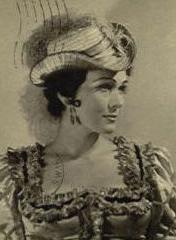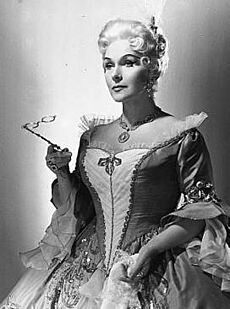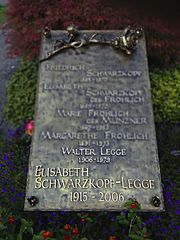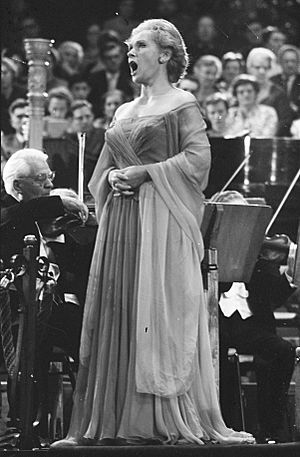Elisabeth Schwarzkopf facts for kids

Dame Elisabeth Schwarzkopf was a very famous opera singer from the 20th century. She was born in Jarotschin, Prussia, on December 9, 1915, and passed away in Schruns, Austria, on August 3, 2006. She had a beautiful soprano voice and was known for singing music by composers like Mozart, Schubert, and Strauss. She was also a great concert singer.
Contents
Early Life and Musical Start
Elisabeth Schwarzkopf was born in a place called Jarotschin in Prussia. From a young age, she loved music. She first sang in an opera when she was just 13 years old, in 1928. She played the part of Eurydice in a school show called Orfeo ed Euridice by Gluck in Magdeburg, Germany.
In 1934, Elisabeth began studying music at the Berlin Hochschule für Musik. Later, she changed teachers and learned from the famous soprano Maria Ivogün and her husband, the pianist Michael Raucheisen.
Beginning Her Professional Career
Elisabeth Schwarzkopf had her first professional performance on April 15, 1938, at the Deutsche Oper Berlin (German Opera in Berlin). She sang a small part in Richard Wagner's opera Parsifal. She sang in Berlin for four years. During this time, she joined the Nazi Party. Because of this, she was later not allowed to perform in the United States for a while.
In 1942, she was asked to sing with the Vienna State Opera in Austria. There, she performed many important roles. These included Konstanze in Mozart's Die Entführung aus dem Serail, Musetta and later Mimì in Puccini's La bohème, and Violetta in Verdi's La traviata.
Singing Around the World

After World War II, in 1945, Elisabeth Schwarzkopf became an Austrian citizen. This allowed her to continue singing at the Vienna State Opera. In 1947 and 1948, she toured with the Vienna State Opera. She sang at London's Royal Opera House at Covent Garden and at La Scala in Milan, Italy. One of her most famous roles was the Countess in Mozart's The Marriage of Figaro.
From then on, she was invited to sing all over the world, including at the San Francisco Opera in the United States.
In March 1946, Elisabeth auditioned for Walter Legge. He was a British producer who made classical music recordings and had started the Philharmonia Orchestra. Walter Legge was so impressed with her voice that he offered her a special contract with EMI, a big record company. They worked together a lot and got married on October 19, 1953, in England. Because she married an Englishman, Elisabeth also became a British citizen.
In the 1960s, Elisabeth Schwarzkopf mostly sang five of her favorite opera roles. These included Donna Elvira in Mozart's Don Giovanni, the Countess in The Marriage of Figaro, and the Marschallin in Der Rosenkavalier by Richard Strauss. She also made popular recordings of light operas called "operettas," like Franz Lehár's The Merry Widow.
Elisabeth Schwarzkopf's last opera performance was on December 31, 1971, in Brussels, where she sang the Marschallin. After that, she focused on singing lieder (German art songs) in concerts.
On March 17, 1979, her husband, Walter Legge, had a serious heart attack. He still went to her last concert two days later in Zurich. Three days after that, he passed away.
Later Life and Legacy
After her husband's death, Elisabeth Schwarzkopf stopped performing. She then taught music and gave special classes called master classes to young singers around the world. She taught at places like the Juilliard School in New York City. After living in Switzerland for many years, she moved back to Austria.
She received many honors for her contributions to music. In 1976, she was made a doctor of music by the University of Cambridge. In 1992, she was made a Dame Commander of the Order of the British Empire (DBE) by the Queen of England. This is a very high honor.
Elisabeth Schwarzkopf died peacefully in her sleep on August 2 or 3, 2006, at her home in Schruns, Austria. She was 90 years old. Her ashes, along with those of Walter Legge, were buried next to her parents in Zumikon, Switzerland.
Many people believe Elisabeth Schwarzkopf was the greatest German lyric soprano of the 20th century. She is also considered one of the best Mozart singers ever, known for her incredibly beautiful voice.
Awards and Honors
Elisabeth Schwarzkopf received many awards during her life, including:
- The Edison Award in Amsterdam in 1961.
- Being named an honorary member of the Royal Swedish Academy of Music in 1964.
- The Hugo-Wolf Medal in 1971.
- The Grand Cross of the Order of Merit of the Federal Republic of Germany in 1974.
- Becoming an honorary member of the Vienna State Opera in 1983.
- The UNESCO Mozart Medal in 1991.
- Being made a Dame Commander of the Order of the British Empire in 1992.
- Being voted into the Gramophone Hall of Fame in 2012.
See also
 In Spanish: Elisabeth Schwarzkopf para niños
In Spanish: Elisabeth Schwarzkopf para niños
 | Claudette Colvin |
 | Myrlie Evers-Williams |
 | Alberta Odell Jones |



